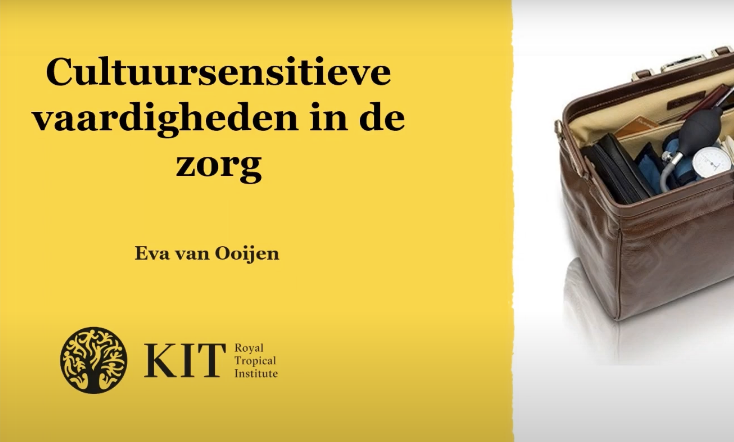
KIT (Royal Tropical Institute) is working to increase cultural sensitivity in healthcare. On what exactly that means, Amsterdam – Divers & Inclusive talks to Eva van Ooijen, intercultural trainer and medical anthropologist at KIT.
KIT has expertise on both cultural sensitivity and healthcare. These two subjects come together in a training course ‘Cultural Sensitivity Skills in Healthcare’. How did this training course for healthcare staff come about?
KIT Intercultural Professionals (part of KIT) does nothing but develop solutions to bridge cultural differences. For many years, we have provided the ‘Understanding the Dutch’ training course for expats new to the Netherlands. The training consists of interactive sessions where information is provided on various aspects of living and working in the Netherlands and experiences are exchanged. For many expats, the Dutch healthcare system proved to be a point of uncertainty. They do not know where to go for certain care and do not get the care they expect or want. This can lead to frustration, worries about their own health but also to little trust in the GP. We concluded that newcomers need better explanations about our healthcare system and that healthcare providers need the right tools to work in a culturally sensitive way. We then developed the training course ‘Culture-sensitive working in health care’. The municipality of Amsterdam financed part of the development costs and provided a number of (pilot) training courses. That way, several GPs, doctors’ assistants and practice support workers from different practices in Amsterdam were able to follow the training at an early stage. Initially, the training focused on providing care to expats, but already in the pilot phase this was extended to ‘internationals’ in a broader sense: all patients with a migration background, both new and oldcomers.
Is there a strong business case for diversity in healthcare?
The patient population is not homogeneous. You cannot ignore this diverse population, as our society is diverse. Healthcare providers sometimes find that if there are communication problems and cultural differences, they cannot provide the quality of care they would like. It costs more money and time if you can’t understand complaints properly, so patients keep coming back, which ultimately leads to more expensive interventions. Moreover, it is frustrating for both sides when someone is not helped in the best possible way. When patient and healthcare provider understand each other, it leads to reduced length of stay, fewer readmissions, fewer patients walking around too long with their complaints and so on. Our super-diverse society is a fact of life, so it is incredibly important to factor that into the way we provide care.
What can you tell about the training?
Every culture has its own ideas and practices. As a healthcare provider, it is important to know something about the (cultural) background of different patient groups. This helps to build relationships and make connections. KIT is careful with do’s and dont’s in this respect, though, as they can lead to stereotyping. Someone from Syria may suffer from trauma as a result of the war, but it does not have to be that way. A migrant with a Moroccan background may, in line with his religious precepts, have certain wishes about his final stage of life, but it does not have to be that way. Working culturally sensitive means taking someone’s background into account, being aware of your own background and the influence this has on how you see and do things. It also means that you have the skills to go beyond your own prejudices and enter into a conversation in an open-minded way. You have to be able to deal carefully with someone’s expectations, even if they deviate from what is customary here. Then at least you have a common starting point. As a healthcare provider, you cannot know how healthcare works in each specific country. And within each culture there are many differences (in level of education, generation, growing up in the city or the countryside, you name it). That is why we focus on developing general cultural competences. In doing so, you will initially take a critical look at your own ideas and views on healthcare. You will soon realise that your way of working is strongly determined by Dutch healthcare culture. Here, we tend to think we deal with care in a ‘normal’ way. But our care culture seems strange to others. The training gives attention to how to see multiple perspectives, avoid communication problems and bridge cultural differences to achieve the best possible care. It opens participants’ eyes.
What is an example of this Dutch healthcare culture?
Whatever your problem, you contact your GP first. This acts as a kind of gatekeeper. In other countries, you might go straight to the specialist or to the hospital. In the Netherlands, you only go to A&E if it is an emergency. But what then is emergency, thinks a newcomer. A child with a fever? Also, the GP here has only eight minutes for you to hear your problem and follow up if necessary. There is not much time for relationship-building or to look at underlying problems. In the Netherlands, you also get to the point fairly quickly, but in other cultures this is rude. We pay attention to this in the training: the caregiver recognises the pattern and can help the patient clarify the request for help. Also, here it is normal and reassuring if the doctor says: “Just take two paracetamol at home and call us if the fever is not gone in three days.” In another culture, the doctor will immediately prescribe medicine; logical, for example, if you live in an area with many infectious diseases, such as malaria. In the Netherlands, the patient can then get the idea that the doctor does not want to help. Then you often hear: I am not taken seriously because I am a foreigner. Because it is not clear why the requested medicines are not prescribed, it is perceived that way. Again, why does a patient show certain behaviour? Does this person have sufficient (Dutch) language skills to express himself in a nuanced way? Did this patient perhaps lose a family member to malaria and is 1 day of fever indeed a reason for him/her to intervene? As a healthcare provider, try to be open to different scenarios.
What are examples of consequences of a lack of a culturally sensitive care system?
These are numerous. Consequences include longer hospital stays and more visits to the emergency room. For instance, children with a migrant background are less likely to be diagnosed with dyslexia or ADHD, because care providers are more likely to think they have a language deficiency or are just busy children. As a result, they do not receive proper guidance, which in turn affects their future and self-confidence. For example, more Covid deaths have also been found among people from migrant backgrounds and have been shown to be less willing to be vaccinated.
This is again related to low trust in care and, due to language barriers, poorer understanding of coronary care. There is also a high need for palliative care for older people from migrant backgrounds. This is the case, for example, of first-generation Turkish and Moroccan migrants, who are now of advanced age, sometimes lose their Dutch language and fall back on their mother tongue. It would be ideal if care staff reflect diverse Dutch society. This helps bridge language and cultural issues. It is also nice if information materials are available in different languages in different places. Healthcare is (fortunately) a universal right. As a society, you have a responsibility to ensure that good healthcare is accessible to everyone.
The said training is of interest to anyone working with people from a different cultural background, such as GPs, practice support workers and midwives. See also the short webinar Culture-sensitive skills in healthcare, by Eva van Ooijen .
